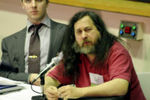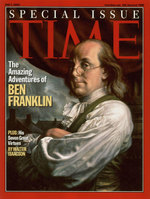The idea that freedom carries obligations with it is the most universally accepted yet universally disputed point one can make.
Freedom isn’t free. That’s what all the conservative bumper stickers say. Yet what they mean by that is quite different from what I think. They mean freedom carries with it an obligation to fight, on behalf of the nation, however the government defines the national interest, and however that government may be constituted.
In the world of open source, which I cover at ZDNet, there is another way of looking at this question, as put to us by Richard Stallman (above). You are given something, free. You can use it, you can see it, you can change it, you can add to it. But in return you have an obligation to give your changes back to the community, in the same way the original software was given to you.
The whole idea of open source as a business movement is in fact a reaction against Stallman, and this sense that freedom carries obligations. Stallman calls his movement FOSS — Free and Open Source Software.
Licenses other than the GPL, however they differ in their details, are simply a way to fudge this obligation in some way, in the interests of profit. You don’t have to share, or you have to give us credit, or your improvements belong to me, or you can only share if it’s going to certain people. Changing the obligation of freedom in the name of someone else.
One of the big business trends of 2006, by the way, is that GPL licensing grew among open source businesses, while licensing under other terms declined. Most notably, just recently, Sun decided it would make Java open source, under the GPL.
After giving this a lot of thought, I come down on Stallman’s side. The obligation of freedom is to give it to others. Those
who would take freedom of speech for themselves but deny it to others
aren’t calling for freedom, but its opposite. No matter how much they bleat that they are on freedom’s side, they simply are not. Because they don’t accept freedom’s basic bargain. They demand absolute trust
for themselves, but they can’t really trust anyone else.
All these views of freedom, in the end, come back to the Internet.
The Internet isn’t a place or a process but a protocol. It’s a way in
which you can connect computers. It does not perfect man. It doesn’t
change man at all. It merely gives man another way to ask these old
questions, another forum in which to battle them out.
IP and the U.S. Constitution hold that in common. The Constitution
is "a republic, if you can keep it" in Franklin’s words. We have the
obligation to fight for what it really means, against all enemies
foreign and domestic, even when those enemies hold the highest
positions in the land. To continue it requires intelligent belief. Not
the open-hearted, empty-headed belief in Santa Claus. The
open-minded, mutual belief we give one another in marriage.














Sun is using the GPL (2 BTW) as a competitive weapon, ironically against fragmentation vs. IBM/Apache. At least one Java bigwig has left in disgust. For GPL fans, it’s as if a giant bird splattered you with bronze turd.
Growing up, we all had one relative or family friend who would give us a gift and then make us feel obligated, sortof hold it over our heads. We humored that person and eventually figured out that nobody liked that kind of control, that it was basically a pretty socially retarded way to operate. It didn’t help that none of the adults felt comfortable leaving him alone with their kids.
A much better analogy might be what a couple does in bed. The GPL is like “I did this for her, but she wouldn’t do this for me”. That’s really pretty self-absorbed and dysfunctional. Ideally, both contribute because they want to, not because they are obligated. It keeps every act as a gift, rather than payback. I know, your average computer geek would never get this one…
Robert Cialdini’s landmark book “Influence” deconstructs all the tactics that made us fall for Hari Krishnas and the like, which is the perfect analogy for how the GPL works. I think eventually, the classic behavioral science and literature will be applied to open source en mass, and people will realize that the BSD license is the civilized and socially acceptable way to share.
Sun is using the GPL (2 BTW) as a competitive weapon, ironically against fragmentation vs. IBM/Apache. At least one Java bigwig has left in disgust. For GPL fans, it’s as if a giant bird splattered you with bronze turd.
Growing up, we all had one relative or family friend who would give us a gift and then make us feel obligated, sortof hold it over our heads. We humored that person and eventually figured out that nobody liked that kind of control, that it was basically a pretty socially retarded way to operate. It didn’t help that none of the adults felt comfortable leaving him alone with their kids.
A much better analogy might be what a couple does in bed. The GPL is like “I did this for her, but she wouldn’t do this for me”. That’s really pretty self-absorbed and dysfunctional. Ideally, both contribute because they want to, not because they are obligated. It keeps every act as a gift, rather than payback. I know, your average computer geek would never get this one…
Robert Cialdini’s landmark book “Influence” deconstructs all the tactics that made us fall for Hari Krishnas and the like, which is the perfect analogy for how the GPL works. I think eventually, the classic behavioral science and literature will be applied to open source en mass, and people will realize that the BSD license is the civilized and socially acceptable way to share.